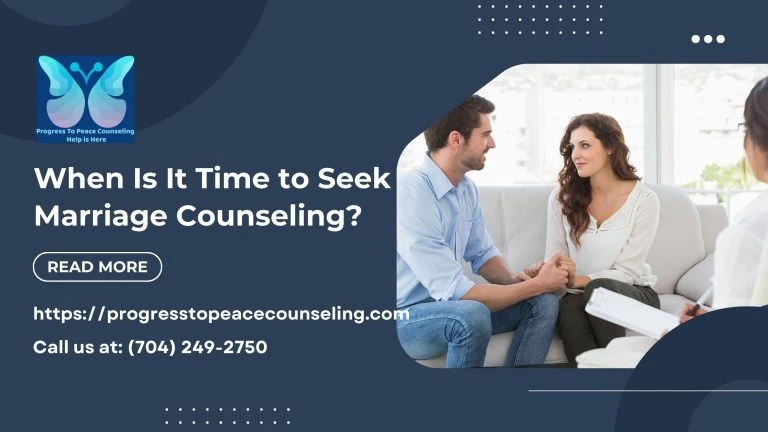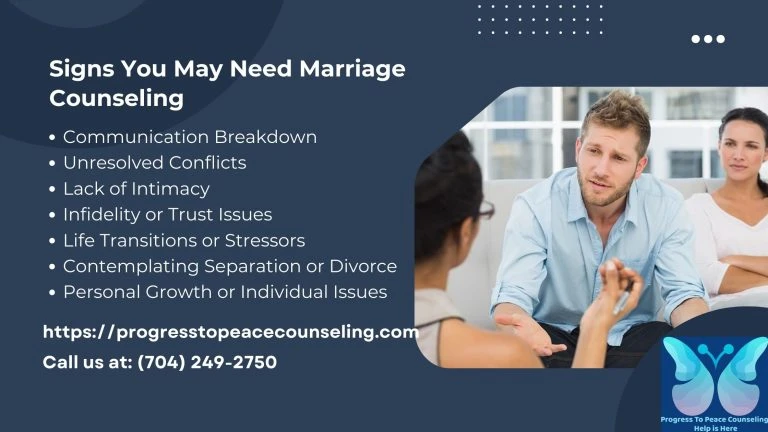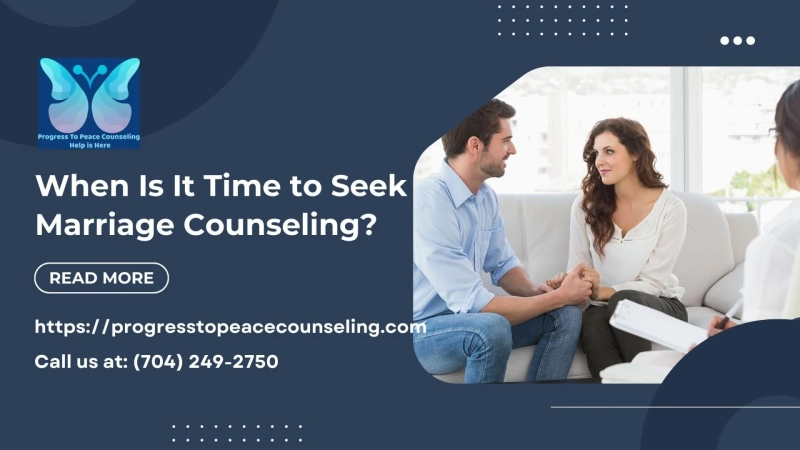
Marriage is a beautiful union, but like any relationship, it comes with its fair share of ups and downs. Even the happiest couples experience challenges and conflicts that can strain their bond. In such situations, many couples may wonder if it\'s time to seek professional help from a marriage counselor. While there\'s no one-size-fits-all answer, there are certain signs that can indicate when seeking counseling may be beneficial. If you are searching for the best marriage counseling therapist in Charlotte NC to get relationship guidance then you can count on the professional experts at Progress To Peace Counseling.
7 Signs You May Need Marriage Counseling
Communication Breakdown
Effective communication is the foundation of any healthy relationship. When communication breaks down, it can lead to misunderstandings, resentment, and a growing emotional distance between partners.
If you and your spouse find yourselves constantly arguing, walking on eggshells, or avoiding difficult conversations, it may be time to seek counseling. A therapist can provide tools and strategies to improve your communication skills, foster active listening, and help you express yourselves in a more constructive manner.
Unresolved Conflicts
All couples have disagreements, but when conflicts remain unresolved and fester over time, they can create deep rifts in the relationship. Whether it\'s issues related to finances, intimacy, parenting styles, or differing values, unresolved conflicts can breed resentment and emotional disconnection.
If you and your partner find yourselves stuck in a cycle of recurring arguments without resolution, seeking professional guidance can help you navigate these challenges in a healthier, more productive way.
Lack of Intimacy
Intimacy is a crucial aspect of any romantic relationship, encompassing not only physical closeness but also emotional and spiritual connection. When intimacy wanes, it can leave one or both partners feeling unfulfilled, rejected, or disconnected.
If you and your spouse are struggling with a lack of intimacy, whether it\'s due to differing libidos, emotional barriers, or other factors, counseling can help you explore the underlying issues and work towards rekindling that intimate connection.
Infidelity or Trust Issues
Infidelity, whether emotional or physical, can shatter the trust and foundation of a marriage. If one partner has been unfaithful, or if there are lingering trust issues from past transgressions, seeking counseling can be instrumental in rebuilding that trust and addressing the root causes that led to the breach.
A therapist can guide you through the healing process, help you communicate your feelings, and provide strategies for rebuilding a stronger, more transparent relationship.
Life Transitions or Stressors
Major life transitions, such as the arrival of a new baby, job changes, financial difficulties, or the loss of a loved one, can place significant strain on a marriage. These stressors can create tension, miscommunication, and a shift in priorities or dynamics.
If you and your partner are struggling to navigate these transitions and find yourselves drifting apart or unable to support each other effectively, counseling can provide invaluable guidance and tools to help you weather these storms together.
Contemplating Separation or Divorce
If you or your partner have begun contemplating separation or divorce, it\'s a clear sign that professional intervention is needed.
While counseling doesn\'t guarantee a resolution, it can provide a safe, neutral space to explore the underlying issues, work through conflicts, and determine whether the relationship can be repaired or if ending the marriage is the healthiest choice for both parties.
Personal Growth or Individual Issues
Sometimes, personal growth or individual issues can impact a marriage. If one partner is struggling with mental health challenges, addiction, or significant personal changes, it can strain the relationship.
In such cases, counseling can help address these individual concerns while also providing support and guidance for the couple to navigate the impact on their marriage.

It\'s important to remember that seeking counseling is not an admission of failure or a sign of weakness. Rather, it\'s a proactive step towards strengthening your relationship and fostering a healthier, more fulfilling partnership.
By working with a qualified therapist, you and your spouse can gain valuable insights, learn effective communication strategies, and develop the tools needed to navigate the challenges you\'re facing together.
If you\'re unsure whether it\'s time to seek counseling, consider discussing it openly with your partner. Share your concerns and express a desire to work on improving your relationship. Many couples find that starting counseling earlier, before issues become deeply entrenched, can be more effective and less challenging.
Additionally, it\'s crucial to find a counselor who is a good fit for you and your partner. Look for a licensed therapist with experience in marriage and couples counseling, and don\'t be afraid to interview potential counselors to ensure you feel comfortable and confident in their approach.
Remember, seeking counseling is not a failure – it\'s an investment in your relationship. By taking this proactive step, you and your partner can gain valuable insights, develop effective communication strategies, and work towards rebuilding a stronger, more fulfilling partnership.
Conclusion
In conclusion, if you and your spouse are experiencing consistent challenges, communication breakdowns, trust issues, or a lack of intimacy, it may be time to seek the guidance of a professional marriage counselor. While the decision to seek counseling can be difficult, it can ultimately be a powerful tool in strengthening your bond, resolving conflicts, and fostering a deeper understanding and connection with your partner.
FAQs (Frequently Asked Questions)
Q: What are the benefits of marriage counseling?
A: Marriage counseling can provide numerous benefits, including improved communication skills, tools for conflict resolution, strategies for rebuilding trust and intimacy, guidance for navigating life transitions or stressors, a neutral space to explore issues, and potentially saving the marriage.
Q: Is it common for couples to seek counseling?
A: Yes, seeking counseling is quite common and is not a sign of failure or weakness in a relationship. Many couples, even those in healthy marriages, seek counseling to address challenges or strengthen their bond.
Q: When is the best time to seek marriage counseling?
A: It\'s generally recommended to seek counseling as soon as you notice persistent issues or challenges in your relationship. The earlier you address problems, the more effective counseling can be. However, it\'s never too late to seek help, even if you\'re contemplating separation or divorce.
Q: How do we find a good marriage counselor?
A: Look for a licensed therapist with experience in marriage and couples counseling. You can ask for recommendations from trusted sources or check with professional organizations. It\'s also important to interview potential counselors to ensure you feel comfortable with their approach and that they are a good fit for you and your partner.
Q: How long does marriage counseling typically last?
A: The duration of counseling can vary depending on the specific issues and goals of the couple. Some couples may see improvement after a few sessions, while others may need more extensive therapy over several months or longer.
Q: Can counseling save a marriage after infidelity?
A: Counseling can be extremely helpful in rebuilding trust and working through the issues that led to infidelity, but it doesn\'t guarantee that the marriage will be saved. The success of counseling depends on the commitment and effort of both partners to address the underlying problems and work towards healing and reconciliation.
Q: What if only one partner is willing to attend counseling?
A: While it\'s ideal for both partners to participate in counseling, it\'s still possible to benefit from individual therapy if your partner is unwilling to attend. The therapist can provide guidance and support for addressing issues within your control and potentially motivating your partner to join the process.
Q: Can marriage counseling help with intimacy issues?
A: Yes, counseling can be very effective in addressing intimacy issues within a marriage. A therapist can help explore the underlying causes of a lack of intimacy, such as communication problems, emotional barriers, or physical factors, and provide strategies for rekindling that intimate connection.



